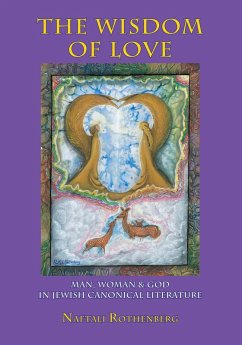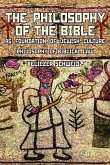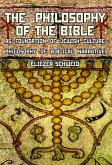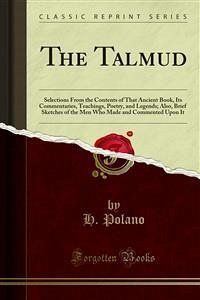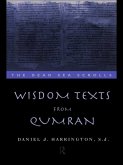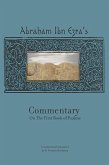130,95 €
130,95 €
inkl. MwSt.
Sofort per Download lieferbar

0 °P sammeln
130,95 €
Als Download kaufen

130,95 €
inkl. MwSt.
Sofort per Download lieferbar

0 °P sammeln
Jetzt verschenken
Alle Infos zum eBook verschenken
130,95 €
inkl. MwSt.
Sofort per Download lieferbar
Alle Infos zum eBook verschenken

0 °P sammeln
- Format: PDF
- Merkliste
- Auf die Merkliste
- Bewerten Bewerten
- Teilen
- Produkt teilen
- Produkterinnerung
- Produkterinnerung

Bitte loggen Sie sich zunächst in Ihr Kundenkonto ein oder registrieren Sie sich bei
bücher.de, um das eBook-Abo tolino select nutzen zu können.
Hier können Sie sich einloggen
Hier können Sie sich einloggen
Sie sind bereits eingeloggt. Klicken Sie auf 2. tolino select Abo, um fortzufahren.

Bitte loggen Sie sich zunächst in Ihr Kundenkonto ein oder registrieren Sie sich bei bücher.de, um das eBook-Abo tolino select nutzen zu können.
Naftali Rothenberg is a senior research fellow and Jewish Culture and Identity Chair at the Van Leer Jerusalem Institute. Rothenberg also serves as the town Rabbi of Har Adar, Israel. He has authored and edited ten books.
- Geräte: PC
- ohne Kopierschutz
- eBook Hilfe
- Größe: 1.05MB
- FamilySharing(5)
Andere Kunden interessierten sich auch für
![The Philosophy of the Bible as Foundation of Jewish Culture (eBook, PDF) The Philosophy of the Bible as Foundation of Jewish Culture (eBook, PDF)]() Eliezer SchweidThe Philosophy of the Bible as Foundation of Jewish Culture (eBook, PDF)130,95 €
Eliezer SchweidThe Philosophy of the Bible as Foundation of Jewish Culture (eBook, PDF)130,95 €![The Philosophy of the Bible as Foundation of Jewish Culture (eBook, PDF) The Philosophy of the Bible as Foundation of Jewish Culture (eBook, PDF)]() Eliezer SchweidThe Philosophy of the Bible as Foundation of Jewish Culture (eBook, PDF)130,95 €
Eliezer SchweidThe Philosophy of the Bible as Foundation of Jewish Culture (eBook, PDF)130,95 €![Sex Rewarded, Sex Punished (eBook, PDF) Sex Rewarded, Sex Punished (eBook, PDF)]() Diane KrigerSex Rewarded, Sex Punished (eBook, PDF)0,00 €
Diane KrigerSex Rewarded, Sex Punished (eBook, PDF)0,00 €![Signs of Virginity (eBook, PDF) Signs of Virginity (eBook, PDF)]() Michael RosenbergSigns of Virginity (eBook, PDF)62,95 €
Michael RosenbergSigns of Virginity (eBook, PDF)62,95 €![The Talmud (eBook, PDF) The Talmud (eBook, PDF)]() H. PolanoThe Talmud (eBook, PDF)8,85 €
H. PolanoThe Talmud (eBook, PDF)8,85 €![Wisdom Texts from Qumran (eBook, PDF) Wisdom Texts from Qumran (eBook, PDF)]() Daniel Harrington S. J.Wisdom Texts from Qumran (eBook, PDF)39,95 €
Daniel Harrington S. J.Wisdom Texts from Qumran (eBook, PDF)39,95 €![Rabbi Abraham Ibn Ezra's Commentary on the First Book of Psalms (eBook, PDF) Rabbi Abraham Ibn Ezra's Commentary on the First Book of Psalms (eBook, PDF)]() Abraham Ibn EzraRabbi Abraham Ibn Ezra's Commentary on the First Book of Psalms (eBook, PDF)130,95 €
Abraham Ibn EzraRabbi Abraham Ibn Ezra's Commentary on the First Book of Psalms (eBook, PDF)130,95 €-
-
-
Naftali Rothenberg is a senior research fellow and Jewish Culture and Identity Chair at the Van Leer Jerusalem Institute. Rothenberg also serves as the town Rabbi of Har Adar, Israel. He has authored and edited ten books.
Dieser Download kann aus rechtlichen Gründen nur mit Rechnungsadresse in A, B, BG, CY, CZ, D, DK, EW, E, FIN, F, GR, HR, H, IRL, I, LT, L, LR, M, NL, PL, P, R, S, SLO, SK ausgeliefert werden.
Produktdetails
- Produktdetails
- Verlag: Academic Studies Press
- Seitenzahl: 236
- Erscheinungstermin: 1. Januar 2009
- Englisch
- ISBN-13: 9781618110985
- Artikelnr.: 56998858
- Verlag: Academic Studies Press
- Seitenzahl: 236
- Erscheinungstermin: 1. Januar 2009
- Englisch
- ISBN-13: 9781618110985
- Artikelnr.: 56998858
- Herstellerkennzeichnung Die Herstellerinformationen sind derzeit nicht verfügbar.
Naftali Rothenberg is a senior research fellow and Jewish Culture and Identity Chair at the Van Leer Jerusalem Institute. Rothenberg also serves as the town Rabbi of Har Adar, Israel. He has authored and edited ten books.
Preface. Introduction: Love in the Canonical Literature: Dealing with Cognitive Dissonance. Section I: the Androgyne Unity; Separation; Desire and Unity. 1. the Androgyne Myth According to Plato. 2. Male and Female Unity, Primoridal Sin and Rebellion against the Gods. 3. In the Midrash: Androgynous Adam. 4.In the Kabbalah: An Eternal / Divine, Spiritual and Human Androgyne. 5. The Rebirth of the Androgyne: Judah Abravanel Cites Plato and Moses. 6. Summary: The Power of Myths. Section II: A Profile of the Sage of Love. 1. Introduction: The Philosopher as Sage of Love. 2. The Love of Rachel. 3. Th e Sage of Love
Rescues
the Song of Songs. 4. Practice and Theory in the Wisdom of Love. 5. The Sage and Temptation. 6. Love Thy Fellow as the Basis of Human Socialization. 7. Optimism Out of Love. 8. Ultimate Love. 9. The Orchard of Love. 10. Summary: The Universal Sage. Section III: The Sage of Unconsummated Love: Judah Abravanel's Dialoghi d'Amore. 1. Introduction: Philo and Sophia. 2. The Sage's Desire. 3. Love as Universal Phenomenon. 4. The Paradox of Abstract Perception. 5. Love and Beauty. 6. When and Where was Love Born? 7. Unconsummated Love. Section IV: Written For Men by Men: Feminist Revolution and Innovation in the Canonical Sources. 1. Introduction: Identifying revolutionary and Innovative Approaches in cultural Sources. 2. A Monogamous Message to a Polygamous Culture. 3. Onah: The Obligation to have Sex for Pleasure. 4. The Love Relationship as Perfection: the End of Male Exclusivity. 5. Summary: Innovation and the Norm. Section V: Contrast and Harmony in Married Life: On Spirituality and Abstinence. 1. Introduction: the Dualistic Approach. 2. Marriage and Intellectual Growth: Help or Hindrance? 3. Categorical Rejection: Abstinence is Punishable by Death! 4. The Dilemma of Abstinence for Individuals on a High Spiritual Plane. 5. Moses' Abstinence. 6. Abstinence: A Precondition for Love in the Philosophy of Rabbi Bahya Ibn Pakuda.7. Rabbi Judah Halevi
s Rejection of Abstinence. 8. Summary: Maintaining Balance. Bibliography. Index.
Rescues
the Song of Songs. 4. Practice and Theory in the Wisdom of Love. 5. The Sage and Temptation. 6. Love Thy Fellow as the Basis of Human Socialization. 7. Optimism Out of Love. 8. Ultimate Love. 9. The Orchard of Love. 10. Summary: The Universal Sage. Section III: The Sage of Unconsummated Love: Judah Abravanel's Dialoghi d'Amore. 1. Introduction: Philo and Sophia. 2. The Sage's Desire. 3. Love as Universal Phenomenon. 4. The Paradox of Abstract Perception. 5. Love and Beauty. 6. When and Where was Love Born? 7. Unconsummated Love. Section IV: Written For Men by Men: Feminist Revolution and Innovation in the Canonical Sources. 1. Introduction: Identifying revolutionary and Innovative Approaches in cultural Sources. 2. A Monogamous Message to a Polygamous Culture. 3. Onah: The Obligation to have Sex for Pleasure. 4. The Love Relationship as Perfection: the End of Male Exclusivity. 5. Summary: Innovation and the Norm. Section V: Contrast and Harmony in Married Life: On Spirituality and Abstinence. 1. Introduction: the Dualistic Approach. 2. Marriage and Intellectual Growth: Help or Hindrance? 3. Categorical Rejection: Abstinence is Punishable by Death! 4. The Dilemma of Abstinence for Individuals on a High Spiritual Plane. 5. Moses' Abstinence. 6. Abstinence: A Precondition for Love in the Philosophy of Rabbi Bahya Ibn Pakuda.7. Rabbi Judah Halevi
s Rejection of Abstinence. 8. Summary: Maintaining Balance. Bibliography. Index.
Preface. Introduction: Love in the Canonical Literature: Dealing with Cognitive Dissonance. Section I: the Androgyne Unity; Separation; Desire and Unity. 1. the Androgyne Myth According to Plato. 2. Male and Female Unity, Primoridal Sin and Rebellion against the Gods. 3. In the Midrash: Androgynous Adam. 4.In the Kabbalah: An Eternal / Divine, Spiritual and Human Androgyne. 5. The Rebirth of the Androgyne: Judah Abravanel Cites Plato and Moses. 6. Summary: The Power of Myths. Section II: A Profile of the Sage of Love. 1. Introduction: The Philosopher as Sage of Love. 2. The Love of Rachel. 3. Th e Sage of Love
Rescues
the Song of Songs. 4. Practice and Theory in the Wisdom of Love. 5. The Sage and Temptation. 6. Love Thy Fellow as the Basis of Human Socialization. 7. Optimism Out of Love. 8. Ultimate Love. 9. The Orchard of Love. 10. Summary: The Universal Sage. Section III: The Sage of Unconsummated Love: Judah Abravanel's Dialoghi d'Amore. 1. Introduction: Philo and Sophia. 2. The Sage's Desire. 3. Love as Universal Phenomenon. 4. The Paradox of Abstract Perception. 5. Love and Beauty. 6. When and Where was Love Born? 7. Unconsummated Love. Section IV: Written For Men by Men: Feminist Revolution and Innovation in the Canonical Sources. 1. Introduction: Identifying revolutionary and Innovative Approaches in cultural Sources. 2. A Monogamous Message to a Polygamous Culture. 3. Onah: The Obligation to have Sex for Pleasure. 4. The Love Relationship as Perfection: the End of Male Exclusivity. 5. Summary: Innovation and the Norm. Section V: Contrast and Harmony in Married Life: On Spirituality and Abstinence. 1. Introduction: the Dualistic Approach. 2. Marriage and Intellectual Growth: Help or Hindrance? 3. Categorical Rejection: Abstinence is Punishable by Death! 4. The Dilemma of Abstinence for Individuals on a High Spiritual Plane. 5. Moses' Abstinence. 6. Abstinence: A Precondition for Love in the Philosophy of Rabbi Bahya Ibn Pakuda.7. Rabbi Judah Halevi
s Rejection of Abstinence. 8. Summary: Maintaining Balance. Bibliography. Index.
Rescues
the Song of Songs. 4. Practice and Theory in the Wisdom of Love. 5. The Sage and Temptation. 6. Love Thy Fellow as the Basis of Human Socialization. 7. Optimism Out of Love. 8. Ultimate Love. 9. The Orchard of Love. 10. Summary: The Universal Sage. Section III: The Sage of Unconsummated Love: Judah Abravanel's Dialoghi d'Amore. 1. Introduction: Philo and Sophia. 2. The Sage's Desire. 3. Love as Universal Phenomenon. 4. The Paradox of Abstract Perception. 5. Love and Beauty. 6. When and Where was Love Born? 7. Unconsummated Love. Section IV: Written For Men by Men: Feminist Revolution and Innovation in the Canonical Sources. 1. Introduction: Identifying revolutionary and Innovative Approaches in cultural Sources. 2. A Monogamous Message to a Polygamous Culture. 3. Onah: The Obligation to have Sex for Pleasure. 4. The Love Relationship as Perfection: the End of Male Exclusivity. 5. Summary: Innovation and the Norm. Section V: Contrast and Harmony in Married Life: On Spirituality and Abstinence. 1. Introduction: the Dualistic Approach. 2. Marriage and Intellectual Growth: Help or Hindrance? 3. Categorical Rejection: Abstinence is Punishable by Death! 4. The Dilemma of Abstinence for Individuals on a High Spiritual Plane. 5. Moses' Abstinence. 6. Abstinence: A Precondition for Love in the Philosophy of Rabbi Bahya Ibn Pakuda.7. Rabbi Judah Halevi
s Rejection of Abstinence. 8. Summary: Maintaining Balance. Bibliography. Index.
